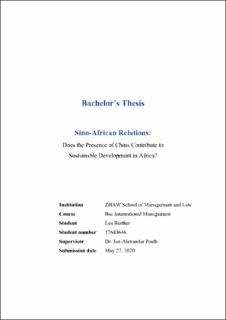Please use this identifier to cite or link to this item:
https://doi.org/10.21256/zhaw-21758| Publication type: | Bachelor thesis |
| Title: | Sino-African relations : does the presence of China contribute to sustainable development in Africa? |
| Authors: | Berther, Lea |
| Advisors / Reviewers: | Posth, Jan-Alexander |
| DOI: | 10.21256/zhaw-21758 |
| Extent: | 69 |
| Issue Date: | 2020 |
| Publisher / Ed. Institution: | ZHAW Zürcher Hochschule für Angewandte Wissenschaften |
| Publisher / Ed. Institution: | Winterthur |
| Language: | English |
| Subject (DDC): | 337: International economics and commerce 338.927: Environmental economics and sustainable development |
| Abstract: | China’s involvement in Africa has steadily increased after its economic reform in 1978. However, since the year 2000, Sino-African trade volumes and Chinese loans to Africa began to rise rapidly. This was further bolstered by the establishment of the Belt and Road Initiative (BRI). This thesis aimed to investigate the implications of the Sino-African relationship. Research was divided into five objectives in order answer the final question of whether the presence of China contributes to sustainable development in Africa. Secondary data was collected with key observations from the findings being discussed with relevant theories in order to examine China’s contribution to the three development levels, namely, economic, human and environmental stewardship. The first section of the findings presented a performance review of Africa against the UN SDGs. This review revealed a dire situation of poverty and unemployment in Africa as well as the prevalence of deeply entrenched corruption. The second section of the findings displayed the performance of China’s businesses against the UN Global Compact’s principles for responsible businesses. The results from this were mixed. While Chinese companies performed well with workforce localization and skills training, they did not score well on corruption and pollution. The third and final findings section aimed to find out what the BRI brings for Africa. It was found that Africa gains from the relationship through the construction of much needed infrastructure. However, considering that the BRI is labeled as a development strategy, China’s impact on job creation in Africa has not yet reached its potential. China on the other hand benefits handsomely from Africa’s participation in the project, as it gains access to raw materials and markets to sustain domestic economic growth. The key observations were then contextualized with relevant theories to gain a better understanding of the phenomenon’s observed. Concerning economic development, findings showed that the case for Africa as the next flying geese was weak, with some notable exceptions in East Africa due to a stable political system. In the case for human development, the extractive institutions theory showed that China needs to assist in anti-corruption measures. In the context of the world systems theory, it was decided that there is a case for exploitation, however, Africa has overall benefitted from the relationship and therefore caution is taken with labeling the relationship as such. From an environmental perspective, the thesis found evidence of China relocating factories that do not meet their own environmental standards. China has since, with pressure from foreign powers, implemented a more environmentally friendly approach to its BRI projects. Limitations of this thesis revolve around the lack of readily and reliable information. China has in the past been accused of underreporting trade and loan data, whereas Africa lacked statistical capacity to gather information. Having said this, continuous workings from the China Africa Research Initiative as well as the largest field study on Chinese companies by McKinsey & Company allowed this thesis to carry out a holistic study. Recommendations for further research suggest focusing on an in-depth analysis on single countries or regions in Africa, as a contrast to analyzing Africa as a single entity. |
| URI: | https://digitalcollection.zhaw.ch/handle/11475/21758 |
| License (according to publishing contract): | CC BY 4.0: Attribution 4.0 International |
| Departement: | School of Management and Law |
| Appears in collections: | BSc International Management |
Files in This Item:
| File | Description | Size | Format | |
|---|---|---|---|---|
| bachelor's thesis_lea berther.pdf | 2.04 MB | Adobe PDF |  View/Open |
Show full item record
Berther, L. (2020). Sino-African relations : does the presence of China contribute to sustainable development in Africa? [Bachelor’s thesis, ZHAW Zürcher Hochschule für Angewandte Wissenschaften]. https://doi.org/10.21256/zhaw-21758
Berther, L. (2020) Sino-African relations : does the presence of China contribute to sustainable development in Africa? Bachelor’s thesis. ZHAW Zürcher Hochschule für Angewandte Wissenschaften. Available at: https://doi.org/10.21256/zhaw-21758.
L. Berther, “Sino-African relations : does the presence of China contribute to sustainable development in Africa?,” Bachelor’s thesis, ZHAW Zürcher Hochschule für Angewandte Wissenschaften, Winterthur, 2020. doi: 10.21256/zhaw-21758.
BERTHER, Lea, 2020. Sino-African relations : does the presence of China contribute to sustainable development in Africa? Bachelor’s thesis. Winterthur: ZHAW Zürcher Hochschule für Angewandte Wissenschaften
Berther, Lea. 2020. “Sino-African Relations : Does the Presence of China Contribute to Sustainable Development in Africa?” Bachelor’s thesis, Winterthur: ZHAW Zürcher Hochschule für Angewandte Wissenschaften. https://doi.org/10.21256/zhaw-21758.
Berther, Lea. Sino-African Relations : Does the Presence of China Contribute to Sustainable Development in Africa? ZHAW Zürcher Hochschule für Angewandte Wissenschaften, 2020, https://doi.org/10.21256/zhaw-21758.
Items in DSpace are protected by copyright, with all rights reserved, unless otherwise indicated.